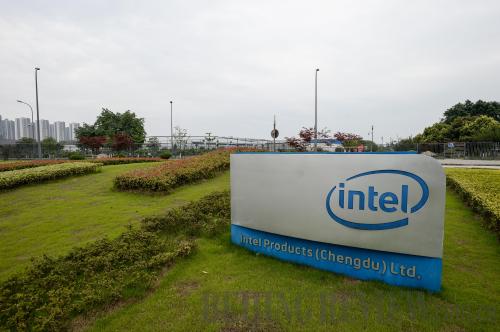|
 |
|
IT MOGUL: Intel's manufacturing base in Chengdu. The company established its presence in the southwestern city in 2003 (LI QIAOQIAO) |
"This year, Chengdu released a policy to encourage university teachers to start up their own businesses. The government will award each professor who does so 200,000 ($32,640) to 1 million ($163,200) yuan as reward. If they are not willing to open new firms, they can go to local companies full time or part time to contribute research. If so, they can receive a 100,000 yuan ($16,320) reward."
Patents are the city's intangible assets, and Chengdu is currently embarking on a path to turn those assets into fortune. "Chengdu established a platform that allows companies use their intellectual property as a mortgage to get bank loans. To date, 99 companies, with over 100 patents total, have received 850 million yuan ($138.72 million) in bank loans through this platform. By solving their financing difficulties, we make sure companies can grow," said Ding.
"Encouraging innovation by rolling out incentives and protecting IPRs will greatly lower Chengdu's investment risks and help transform its pattern of growth."
A talent pool
In addition to the government's effective and efficient service and its efforts on protecting IPRs, a rich talent pool is a crucial reason why many multinationals have turned to Chengdu.
The city has 52 universities and colleges, which injects a large number of graduates every year into the economy. In 2012, a total of 202,224 students graduated from those universities and colleges. An abundance of talent is an important advantage for Chengdu.
The FAW-Volkswagen Automotive Co. Ltd. set up its Chengdu Branch in May 2009. With a total investment of 16.3 billion yuan ($2.66 billion), the annual production value of the Chengdu manufacturing base is estimated to be 108 billion yuan ($17.63 billion).
Liu Jurong, President of the Chengdu Branch of the FAW-Volkswagen, told Beijing Review that one of the major reasons that the company selected Chengdu was the rich talent pool. "We came for the talent. Chengdu has many college graduates and offers qualified professionals for us," said Liu. "Also the western region in China has great market potential."
Bian, General Manager of Intel Chengdu, agreed.
"Tapping the talent pool is the primary reason we are here. We believe the mature education system in Chengdu will offer a great talent pool for the company," said Bian. "Right now, the average age of Intel Chengdu's employees is only 28. We recruit a lot of local graduates.
"Chengdu has the charm to keep the talent to start a life here, with its good environment and profound cultural heritage."
(Reporting from Chengdu, Sichuan Province)
Email us at: zhouxiaoyan@bjreview.com
Chengdu Quick Facts
- Population: 14.18 million
- GDP: 813.89 billion yuan ($132.75 billion), a 13-percent increase from 2011
- Per-capita GDP: 57,624 yuan ($9,399)
- Per-capita disposable income for urban residents: 27,194 yuan ($4,435), up 13.6 percent from 2011
- Per-capita net income for rural residents: 11,501 yuan ($1,876), up 14.2 percent from 2011
- Retail sales: 331.77 billion yuan ($54.11 billion), up 16 percent from 2011
- Exports and imports: $47.54 billion
- Foreign direct investment: $8.59 billion
- Domestic tourist visits: 122.47 million, a growth of 26.6 percent from 2011
- Foreign visitors: 1.58 million, up 28.9 percent from 2011
(Source: Statistical Communique of 2012 Chengdu Economic and Social Development) | 